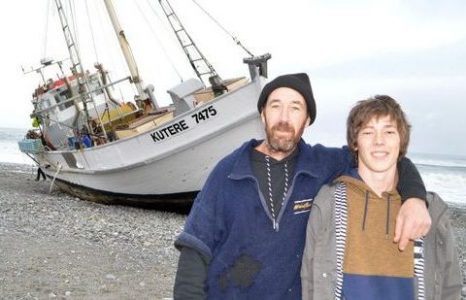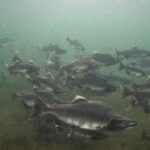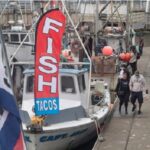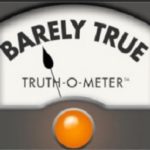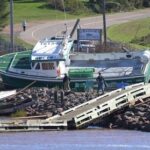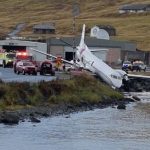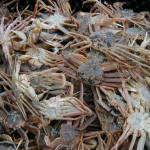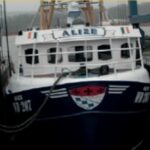Monthly Archives: May 2017
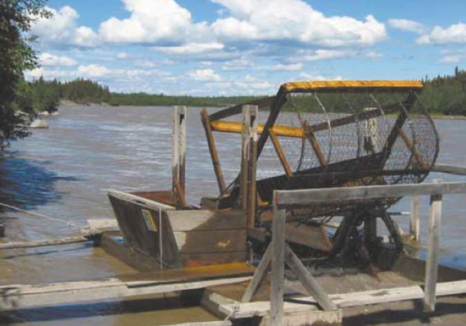
Good bad news?
The Copper River commercial salmon fishery ended Tuesday almost 2,000 Chinook over the 5,000-salmon threshold the Alaska Department of Fish and Game set as the acceptable harvest for 2017, and the fishing season has only begun. Steve Moffitt was at the time reported to be hiking somewhere along the Appalachian Trail on the East Coast of North America some 4,500 miles southeast of the tiny port, community of Cordova on the West Coast not far from the mouth of the Copper. Who the hell is Steve Moffitt? He’s the commercial fisheries biologist who penned a bombshell forecast calling for the return of but 29,000 king salmon, as Alaskans most often call Chinook, to the Copper River this year. He then promptly retired, leaving behind what has now become Alaska’s most watched fishery for a number of reasons: click here to read the story 19:50
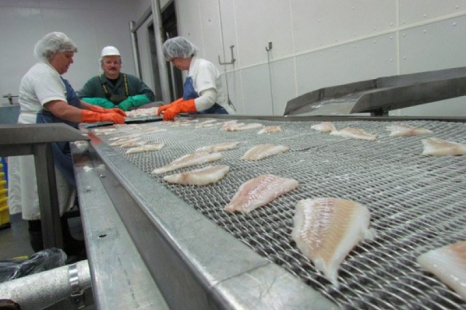
Arnold’s Cove plant owner anxiously awaiting decision on offshore 3Ps
Alberto Warehem is both frustrated and worried. The owner of Icewater Seafoods Inc. in Arnold’s Cove has yet to receive his allocation of offshore 3Ps Cod, even though the Department of Fisheries and Oceans (DFO) announced cod quotas for that fishing zone on Friday, May 19. For the 2017-18 season, the Total Allowable Catch (TAC) for 3Ps cod is 6,500 tonnes. This is a nearly 50 percent reduction from the 2015-2016 TAC of 13,490 tonnes. Wareham needs more detail, however, on how the quota reductions will impact his business. He has 200 workers who depend on the offshore cod quota. For the past several years, the offshore quota of cod gave them 10-12 weeks of work each season; or about 30-40 percent of their annual employment. click here to read the story 19:14
Massachusetts: $185K for fishing research in proposed fiscal year 2018 budget
 The state Senate has added $185,000 for commerical fishing research to its proposed Fiscal Year 2018 budget. State Senate Minority Leader Brice Tarr, R–Gloucester, and state Sen. Mark Montigny, D–New Bedford, worked together to amend the budget. The money will help fund the Industry Based Survey, which partners commercial fishermen with scientists to gather data and develop a science-based understanding of the region’s cod stocks. Those stocks are often viewed as a barometer of the health of many other ground fish stocks, such as haddock and flounder. click here to read the story 18:14
The state Senate has added $185,000 for commerical fishing research to its proposed Fiscal Year 2018 budget. State Senate Minority Leader Brice Tarr, R–Gloucester, and state Sen. Mark Montigny, D–New Bedford, worked together to amend the budget. The money will help fund the Industry Based Survey, which partners commercial fishermen with scientists to gather data and develop a science-based understanding of the region’s cod stocks. Those stocks are often viewed as a barometer of the health of many other ground fish stocks, such as haddock and flounder. click here to read the story 18:14
NT fisherman left with gaping arm wound after developing flesh-eating virus
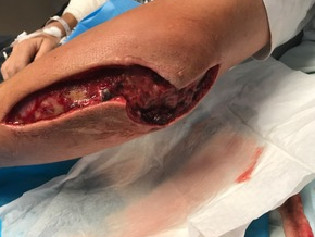 A fisho has been left with a “gaping hole” in his left arm after being spiked by a sawshark and developing a rare flesh-eating virus on a boat off the Darwin coast. The wound on Peter Lucas’ arm is now about 15cm long, and deep enough to reach bone.,, “Sawsharks are an endangered species, so we have to cut them out of the net alive and try and get them overboard in the best condition we possibly can,” he said. “In doing that, the sawshark gave a little bit of a flick … his top tooth just very lightly pierced my elbow. “The operation side of it — the theatre and the doctors — was perfect — they did a great job on my arm. click here to read the story 15:23
A fisho has been left with a “gaping hole” in his left arm after being spiked by a sawshark and developing a rare flesh-eating virus on a boat off the Darwin coast. The wound on Peter Lucas’ arm is now about 15cm long, and deep enough to reach bone.,, “Sawsharks are an endangered species, so we have to cut them out of the net alive and try and get them overboard in the best condition we possibly can,” he said. “In doing that, the sawshark gave a little bit of a flick … his top tooth just very lightly pierced my elbow. “The operation side of it — the theatre and the doctors — was perfect — they did a great job on my arm. click here to read the story 15:23
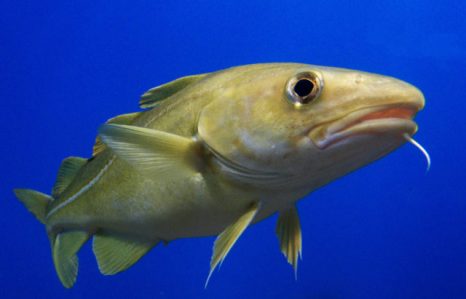
Choppy waters lay ahead for U.S. fisheries – Rebuilding Timeline – Science, or Fiction
Proposed changes to the Magnuson-Stevens Act, our nation’s fishery management law, would compound problems for the nation’s fish, says birder Harrison Tasoff. Fishery management got a significant boost when the act was reauthorized in 2007. The new legislation required the councils to base their strategies and quotas on scientific population surveys. It is crucial that these fish surveys are done by marine biologists. Professional fishermen’s knowledge of fish runs as deep as some of the waters they trawl. But their background prepares them for different kinds of tasks than a marine biologist, whose years of training equip them with the skills to conduct surveys and model ecological phenomena. The 2007 reauthorization also strengthened the timeframe that the agencies have to rebuild depleted fish stocks. Click here to read the article The Magnuson Stevens Act and its Ten Year Rebuilding Timeline: Science or Fiction? by Meghan Lapp One of the initial problems with a mandatory ten year rebuilding timeline is that it creates conflict within the law itself. Taking into account that a defined rebuilding schedule cannot be justified by science, a ten year requirement, or any time specific deadline at all,,, Click here to read the article 13:19
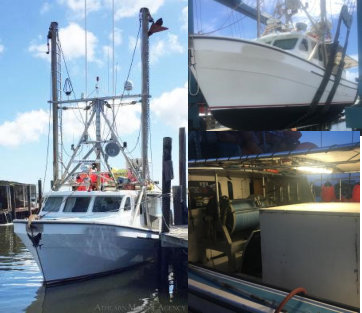
Athearn Marine Agency Boat of the Week: 45′ Provincial Longliner, 530HP, Cummins 6CTA Diesel, Phasor – 6 KW Genset
Specifications, information and 11 photo’s click here To see all the boats in this series, Click here Vessel is in good condition. Tri-pack with Directed Swordfish, Shark, Atlantic Tunas Longline with 2% total Bluefin Quota and Spanish Mackerel for an additional $50,000.
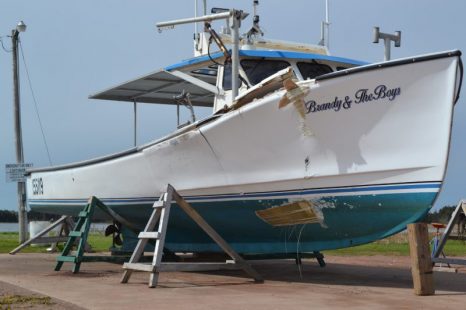
Fishing boats collide near Tignish
A Tignish lobster fishing boat sustained extensive damage to its starboard side when it collided with another lobster boat Monday morning. Both vessels made it back to port under their own power. The Brandy & The Boys was subsequently hauled from the water. Click here to read the story 11:28
Georgia shrimp season opens June 1
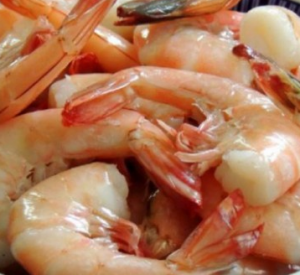 Georgia waters will open for commercial and recreational harvest of food shrimp at 8 a.m. Thursday. “The white shrimp abundance in our May coastwide trawl survey is higher compared to historic averages for the month of May,” said Lindsey Aubart, the Coastal Resources Division biologist supervising monthly shrimp sampling. “The shrimp sizes are highly desirable to recreational harvesters and valuable to commercial fishermen. The recommendation to open on June 1 was made after taking into consideration our May survey results and input received from our Shrimp Advisory Panel.” Last year there were 261 licensed shrimp trawlers and 25 cast-net shrimp harvesters. They brought in an estimated $8.3 million worth of shrimp. click here to read the story 09:56
Georgia waters will open for commercial and recreational harvest of food shrimp at 8 a.m. Thursday. “The white shrimp abundance in our May coastwide trawl survey is higher compared to historic averages for the month of May,” said Lindsey Aubart, the Coastal Resources Division biologist supervising monthly shrimp sampling. “The shrimp sizes are highly desirable to recreational harvesters and valuable to commercial fishermen. The recommendation to open on June 1 was made after taking into consideration our May survey results and input received from our Shrimp Advisory Panel.” Last year there were 261 licensed shrimp trawlers and 25 cast-net shrimp harvesters. They brought in an estimated $8.3 million worth of shrimp. click here to read the story 09:56
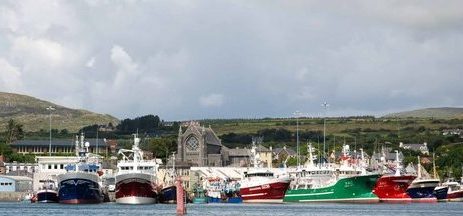
Ireland in danger of losing 30 more fishing vessels with the loss of an estimated 360 jobs say South West fishermen
There have been a lot of the same repeated statements about the rights of 23 RSW Pelagic vessels who have 40% of the €275,317,000 total earnings of Irelands fishing fleet, an estimated 100 million Euro in 2016 increasing to 110 million in 2017. Reports across various media have communicated a message that a Mackerel war has started between North and South. Nothing could be further from the truth. It is amazing to me personally how people’s perception can override the facts but the human brain is an extraordinary muscle. To give a little background on recent events, the Irish South & West Fish Producers Organisation and our colleagues in the fishing Industry were informed by Senior officials in the Department of Marine in early 2016 that our tiny fishing fleet is still too big for our nations meagre fish allocations from the European Union in predominantly our waters that produce some 30% of all fish landed in Europe. We were told that cuts were required to be made to the Whitefish fleet of 30 boats measuring between 12 – 23 Meters. Click here to read the story 09:28
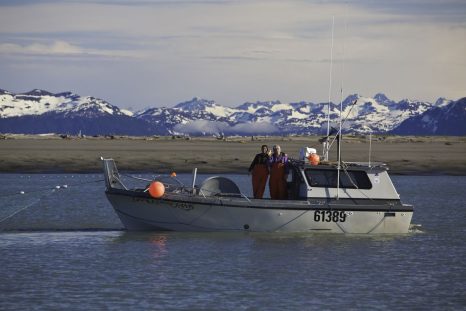
Longtime Cordova fisherman found dead after going overboard on Copper River
A Cordova man was found dead Thursday after going overboard in the Copper River flats during a stormy commercial fishing opener. Clifford “Mick” Johns, 69, had been fishing alone that day on his 29-foot gillnetter, named Dances With Clams. At about 9 p.m., the U.S. Coast Guard received a report that the boat was “driving around in circles with no one onboard” near Pete Dahl Slough, an area of the Copper River flats fishing grounds southeast of Cordova, according to the Alaska State Troopers. “It didn’t look like anybody was manning it,” said Petty Officer 1st Class Jon-Paul Rios of the Coast Guard’s District 17 Public Affairs Office in Juneau. A Coast Guard helicopter stationed in Cordova was called in to search from the air. The helicopter crew found Johns’ body in the water, according to Rios. Click here to read the story 08:41
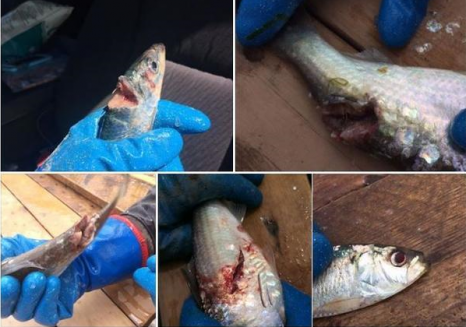
Op-Ed: Something fishy is going on in the Bay of Fundy
If you thought the massive fish and marine animal die-off that took place in Nova Scotia back in December is all cleared up, you’re dead wrong. There have been two more die-offs, but these latest ones are different because they are being caused by man. Besides the massive kill that took place in December that encompassed an area from Annapolis to Yarmouth, there was the mutilated fish brought up in gill nets earlier this month in the Minas Basin area. Now everyone is looking at Nova Scotia Power (NSP) as being the culprit in these latest fish kills. click here to read the story 20:02
Newport Coast Guard Helicopter funding looks promising – not a done deal, but close
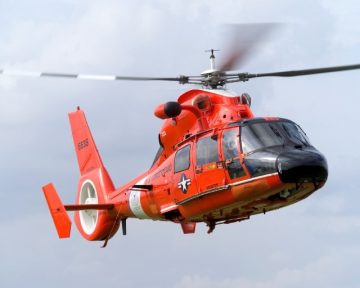 Encouraging news out of Washington DC that a two year extension of funding for the Coast Guard rescue helicopter base at Newport Airport has been approved by a vote of both Democrat and Republican members of the House Committee on Transportation and Infrastructure. The vote is but another step toward ultimate approval by the whole Congress. click here to read the story 18:28
Encouraging news out of Washington DC that a two year extension of funding for the Coast Guard rescue helicopter base at Newport Airport has been approved by a vote of both Democrat and Republican members of the House Committee on Transportation and Infrastructure. The vote is but another step toward ultimate approval by the whole Congress. click here to read the story 18:28
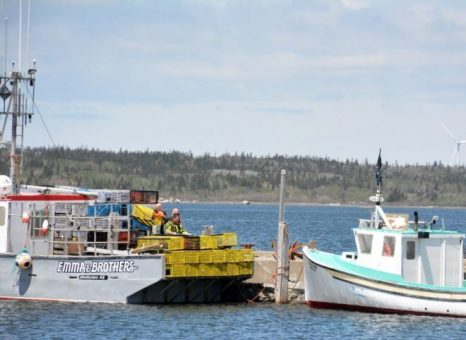
Lobster season drawing to a close off southwestern Nova Scotia
The largest commercial lobster season in Canada comes to a close this week with the end of the season in lobster fishing areas (LFAs) 34 and 33 off southwestern Nova Scotia and along the province’s south shore. Fishermen in these districts have until the end of the day Wednesday, May 31, to haul their traps out of the water, although some had already started bringing loads of traps and gear shore over the weekend. (A nice little rundown of the season, with some very good photo’s of hard working people doing what they do, and a mention in reverence to Fisherman Big Jim Buchanan who tragically lost his life early in the season) Click here to view the photos and read the story. Rest in Peace Jim Buchanan. 17:22
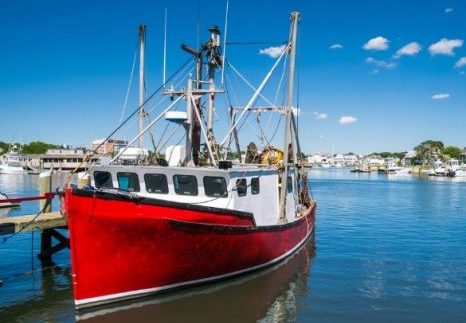
Advancing fishing rule aims to protect deep-sea coral in New England waters
Fishing trawlers bring in an average of $6.4 million annually to Bay State ports from fish scooped off seabeds 600 meters or more below the surface of New England waters. In an effort to save coral on the ocean floor, the New England Fisheries Management Council is advancing a proposed restriction on draggers and trawlers fishing at those depths. The council’s Habitat Committee signed off Tuesday on the proposal, which affect fishing operations in a roughly 25,000 square mile area. If it is passed by the full council it would need to go through the National Marine Fisheries Service, also known as NOAA Fisheries, before it would go into effect. Environmental groups Wild Oceans, Earthjustice, Pew Charitable Trusts and Conservation Law Foundation urged the council’s scientists to study an alternative proposal, which they said would protect more coral than the plan the council advanced. The council agreed to study the conservation groups’ proposal. click here to read the story 16:30
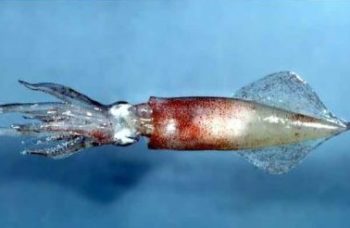
Rhode Island: Squid Fishing is a Boon to the Local Economy
Its high squid fishing season. Recreational anglers crowd the Calamari (Goat Island) Causeway at night, carrying floating water lights and special jigs to scoop them up in buckets. The commercial fleet is pumping squid into the Port of Galilee by the boatload. From the seabed to the boat to a saltwater flume that shoots them into the maw of a dockside processing facility, they are sorted, graded and flash frozen at minus 40 degrees Fahrenheit.,, The Rhode Island fleet has been so adept at maximizing this particular catch that Galilee is now the number one port for longfin squid landings on the East Coast. In 2015, for example, Rhode Island landed sixteen million pounds. New York, its nearest competitor, landed about 4.3 million pounds. click here to read the story 14:34
Did you know Beaufort’s ‘Captain Billy’ North? A memorial Mass will honor him Wednesday
 Woody Collins knew William North for years. He walked the shrimp docks in Port Royal on Wednesday recalling the man the Lowcountry came to know as “Captain Billy.” Captain Billy’s Lowcountry life on the water will be remembered in Beaufort on Wednesday. A memorial Mass for William North will be held at noon at St. Peter’s Catholic Church chapel on Carteret Street. North, known as Captain Billy, was a Beaufort native and longtime charter and commercial fishing boat captain. He died in Georgia on April 17 at age 70. click here to watch the video 12:24
Woody Collins knew William North for years. He walked the shrimp docks in Port Royal on Wednesday recalling the man the Lowcountry came to know as “Captain Billy.” Captain Billy’s Lowcountry life on the water will be remembered in Beaufort on Wednesday. A memorial Mass for William North will be held at noon at St. Peter’s Catholic Church chapel on Carteret Street. North, known as Captain Billy, was a Beaufort native and longtime charter and commercial fishing boat captain. He died in Georgia on April 17 at age 70. click here to watch the video 12:24
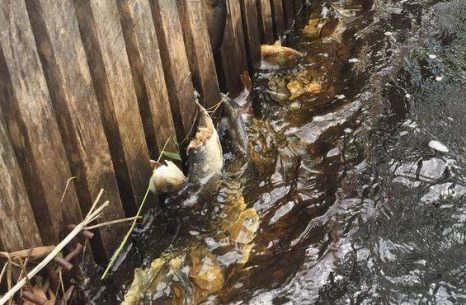
Nova Scotia Power blamed for fish deaths in Gaspereau River
Fishermen, members of the three First Nations Communities of Glooscap, Valley and Sipekne’katik, as well as Fisheries and Oceans officers and scientists, descended upon the White Rock hydroelectric station located along the Gaspereau River Monday morning to see for themselves. A crowd watched from the riverbanks as its current carried the dead fish downstream. Some got caught on the banks and rocks, others in nets, and the smell of dead fish lingered in the air. Several local fishermen estimated the mortality is beyond tens of thousands of the species, after Nova Scotia Power started generating power last week. The largest number of fish deaths reportedly occurred after a third incident in the past week, on Sunday, after the flow on the river was turned up again to help a charity rubber duck race that has been part of the Apple Blossom festival for more than 20 years. click here to read the story 10:48
Steve Holler has been fishing for lobster since he was 14. He’s not about to stop now.
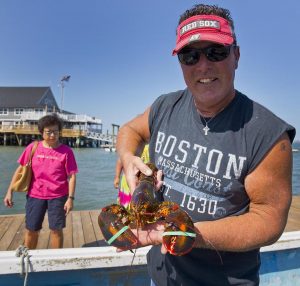 There’s one road into Houghs Neck, Quincy, and if you drive in on a Friday or Saturday in the summer, you’re bound to see the signs: “Lobsters fresh off the boat, 3-6.” Arrows point toward the Maritime Center and down a dock, where you’ll find Steve Holler’s boat, November Gale. Holler is a fixture in Houghs Neck, selling some of the freshest lobsters in the Boston area. He starts back up again June 2, and will keep going through August. Holler, 54, has been a commercial fisherman since the age of 14, when his uncle — a former Navy SEAL — pulled him off the corner, where he was hanging out with friends, and said, “You’re going fishing.”,,, Holler’s idea to sell lobsters fresh off the boat came when he realized he needed to do something different to stay in business. “I’m the only guy who does this, and for a reason,” Holler said. The 19-hour days aren’t for everyone. Still, the creative approach has paid off: It has more than kept his business afloat. He pulled up iPhone photos from some days when the line stretches all the way down the dock and up the beach. click here to read the story 10:01
There’s one road into Houghs Neck, Quincy, and if you drive in on a Friday or Saturday in the summer, you’re bound to see the signs: “Lobsters fresh off the boat, 3-6.” Arrows point toward the Maritime Center and down a dock, where you’ll find Steve Holler’s boat, November Gale. Holler is a fixture in Houghs Neck, selling some of the freshest lobsters in the Boston area. He starts back up again June 2, and will keep going through August. Holler, 54, has been a commercial fisherman since the age of 14, when his uncle — a former Navy SEAL — pulled him off the corner, where he was hanging out with friends, and said, “You’re going fishing.”,,, Holler’s idea to sell lobsters fresh off the boat came when he realized he needed to do something different to stay in business. “I’m the only guy who does this, and for a reason,” Holler said. The 19-hour days aren’t for everyone. Still, the creative approach has paid off: It has more than kept his business afloat. He pulled up iPhone photos from some days when the line stretches all the way down the dock and up the beach. click here to read the story 10:01
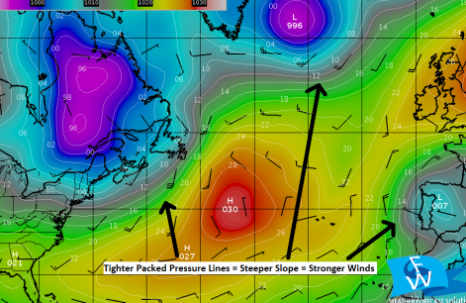
Severe Weather on the High Seas
Many seafarers find themselves subjected to harsh elements, and when it comes to the ocean, nothing “stirs the pot” like the wind; and the winds are a response to pressure differences.
More specifically, winds move from high to low values of pressure, and the greater the differences between the pressure fields, the faster the wind moves. A good way to visualize this process is to imagine a ball rolling down a hill: the steeper the slope of the hill, the faster the ball will roll. Oh gravity, thou are a heartless force. High pressures can ultimately be thought of as “hills”, the low pressures as the “dips”, and the ball is the “wind”. So when analyzing atmospheric pressure patterns, much like a contour elevation map would indicate the steepness or grade to a hiker, tightly spaced pressure contours indicate a steep pressure change pattern, hence higher winds. click here to read the article 08:57
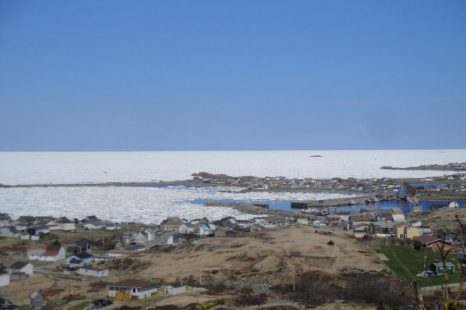
Ice conditions continue – FFAW getting calls from ‘desperate’ workers in 3L
Staff representative for FFAW-Unifor, John Boland, says he is fielding 20 to 25 calls per day from concerned fish harvesters and plant workers in the Bonavista and Trinity Bay areas — all regarding ice conditions. “There are people out there that are severely hurting right now,” Boland told The Packet. “An awful lot of people out there who work in plants — this is a pretty difficult time for them.” Heavy ice conditions have prevented many fish harvesters from fishing, and landings are slow in other areas. Many fish plant workers have yet to work this season as a result. Boland says many workers have had no income at all since early April in some cases. Click here to read the story 19:23
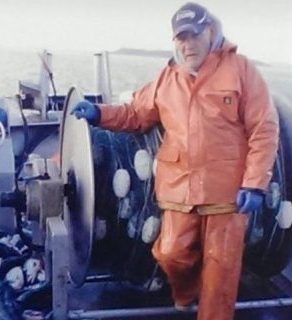
Fishermen trouble
The 68-year-old president of the United Fishermen of Alaska – one of the 49th state’s most powerful lobbies – and three other commercial fishermen have been cited in Cordova for failing to report salmon catches.Jerry McCune said earlier this week that he simply made a mistake after dropping his commercial catch at a tender. McCune said he told the tender to record his catch for the day plus three salmon – a “little teeny king” and two sockeye – he was taking home with him. When he got his “fish ticket” back from the tender, he said, he tossed it into the cabin of the boat without checking to see if his so-called “home pack” catch had been recorded.,,, Some Cordova commercial fishermen reacted to the charges against McCune and the others with claims the actions were politically motivated. Some subsistence, personal-use dipnet, and rod-and-reel fishermen from communities upriver on the Copper or elsewhere in Alaska cited the accusations as evidence of widespread under reporting of Copper River king salmon harvests in the Cordova area. There was no evidence to support either of those ideas, but emotions run hot in Alaska fishery politics or what is often just referred to as “fishtics.” click here to read the story 14:18
Coastal Alabama Rep. slams NOAA ‘junk science’ behind shortest red snapper season ever
 Alabama Rep. Bradley Byrne shares the frustration of most in his district when it comes to the federal government’s overregulation of red snapper fishing. According to him, Coastal Alabamians are infuriated over the announcement that the much-anticipated red snapper season will only last a pitifully short three days. He believes they have a right to be mad. “[My constituents] have every reason to be outraged, because they have a right to fish in the waters of the United States, and they’re being deprived of that right by junk science. Put junk science in, you’re going to get a bad result out, and that’s exactly what we’ve got here,” Rep. Byrne said. Every year, the National Marine Fisheries Service (NMFS), which is managed by the National Oceanic and Atmospheric Administration (NOAA), announces how long the fishing season will last based on the size and stock of red snapper fish. click here to read the story 13:45
Alabama Rep. Bradley Byrne shares the frustration of most in his district when it comes to the federal government’s overregulation of red snapper fishing. According to him, Coastal Alabamians are infuriated over the announcement that the much-anticipated red snapper season will only last a pitifully short three days. He believes they have a right to be mad. “[My constituents] have every reason to be outraged, because they have a right to fish in the waters of the United States, and they’re being deprived of that right by junk science. Put junk science in, you’re going to get a bad result out, and that’s exactly what we’ve got here,” Rep. Byrne said. Every year, the National Marine Fisheries Service (NMFS), which is managed by the National Oceanic and Atmospheric Administration (NOAA), announces how long the fishing season will last based on the size and stock of red snapper fish. click here to read the story 13:45
FISH-NL calls on FFAW to come clean on details of marine escort fees; show compassion to members who owe back dues
 The Federation of Independent Sea Harvesters of Newfoundland and Labrador (FISH-NL) is calling on the FFAW to come clean and reveal the “administrative fee” the union charges fishing boat owners hired by oil companies as marine escorts. On another front, FISH-NL is calling on the FFAW to show compassion to members who owe back dues — given the slash in quotas and severe ice conditions — and allow repayment over a broader time frame. “The FFAW is feeding off its membership at every chance,” says Ryan Cleary, President of FISH-NL. “At the same time, when the membership is vulnerable and expects the union to show some compassion, the FFAW turns its back on them.” Click here to read the press release 13:29
The Federation of Independent Sea Harvesters of Newfoundland and Labrador (FISH-NL) is calling on the FFAW to come clean and reveal the “administrative fee” the union charges fishing boat owners hired by oil companies as marine escorts. On another front, FISH-NL is calling on the FFAW to show compassion to members who owe back dues — given the slash in quotas and severe ice conditions — and allow repayment over a broader time frame. “The FFAW is feeding off its membership at every chance,” says Ryan Cleary, President of FISH-NL. “At the same time, when the membership is vulnerable and expects the union to show some compassion, the FFAW turns its back on them.” Click here to read the press release 13:29
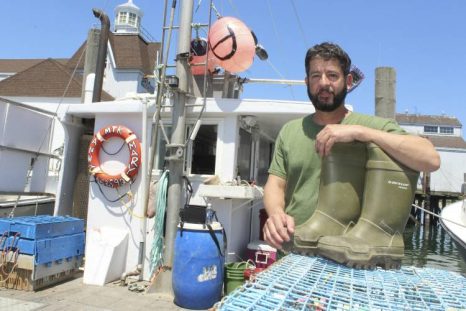
A Lobsterman’s Tale of Survival
The darkest moment of John Aldridge’s 12 terrifying hours of floating alone in the Atlantic Ocean came in the first moments after he was flung off his lobster boat. “You hit the water, you’re in such disbelief,” he recalls. “Nobody in the world knows you’re missing. Their life is happening right now, but your life is done! Right now, in the middle of the ocean, today’s the day you’re going to die.” Not only did Aldridge survive — by pulling a James Bond-like maneuver to turn his boots into flotation aids — but, nearly four years later, he’s still working in the profession that put him in so much danger. And he’s retelling the remarkable tale in a book just released. Click here to read the story 10:37
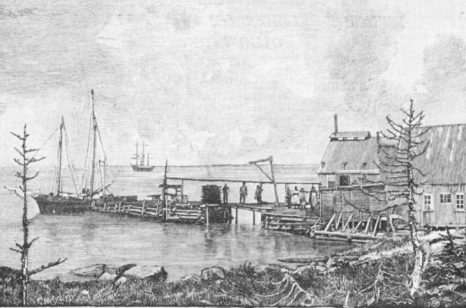
Paul Sparkes: Other species
Lobsters in the hundreds of thousands were hooked, trapped and dragged ashore at Pool’s Island, Bonavista Bay, in the 1870s. Overnight it seemed that everyone was a lobster-fisherman and everyone made money. The story of the first lobster canning operation there is told by our legendary Capt. Abram Kean in less than a page in his 218-page book of life, politics, seal hunts and fisheries. In character, he ends up his little report on the boom and bust lobster experience by blaming the government for its lack of hands-on control. “Seventy years ago,” Kean wrote in 1935, “the canning of lobster was unknown in Newfoundland. The first indication we would get of lobsters would be in April in seal nets. After eating all we wanted for food, the rest would be given to pigs … about sixty or sixty-five years ago people commenced canning lobsters in Bonavista Bay.” Canned Caplin?? Canned Squid?? click here to read the story 09:38
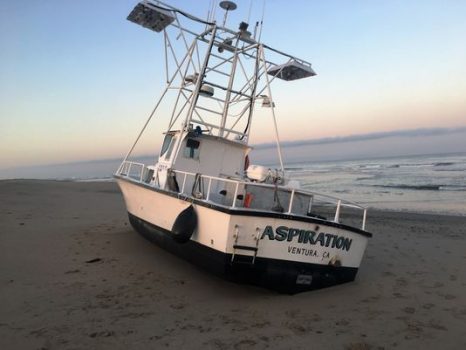
Fishing vessel run aground in Ventura Harbor, California
The Coast Guard responded to a grounded vessel south of Ventura Harbor Sunday. Members of Coast Guard Marine Safety Detachment Santa Barbara and Coast Guard Station Channel Islands Harbor responded to a 36-foot commercial fishing vessel at approximately 1 a.m., after it ran aground near the mouth of the Santa Clara River. MSD Santa Barbara led the response and investigation efforts with the aid of Coast Guard Station Channel Islands Harbor, Coast Guard Sector Los Angeles-Long Beach, Ventura Harbor Patrol, Ventura Fire Department, and Oxnard Fire Department. No injuries or pollution have been reported. The Coast Guard is currently working on the safe removal of the vessel and its contents. The cause of this incident is still under investigation. USCG 08:46
Newport News’ harbormaster proves she’s got what it takes
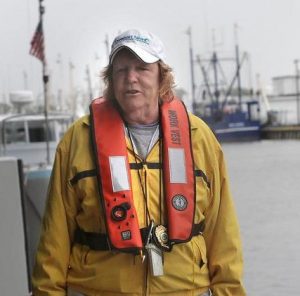 According to a long-held nautical superstition, it is bad luck to have bananas or women on a boat. If that were true, Doreen Kopacz probably would have sunk a ship by now. Kopacz, Newport News’ harbormaster, has worked on boats since she was 8 years old and hardly took time to stop. In what is a largely male-dominated industry, Kopacz worked her way up from boat scrubber to boat captain and, now, harbormaster. She is the first woman since about 1913 to work as Newport News’ harbormaster — the person who patrols the docks and makes sure commercial fisherman are paying their city bills. She’s also expected to review design plans for construction that might happen at the dock, such as a recent mooring system replacement. click here to read the story 18:00
According to a long-held nautical superstition, it is bad luck to have bananas or women on a boat. If that were true, Doreen Kopacz probably would have sunk a ship by now. Kopacz, Newport News’ harbormaster, has worked on boats since she was 8 years old and hardly took time to stop. In what is a largely male-dominated industry, Kopacz worked her way up from boat scrubber to boat captain and, now, harbormaster. She is the first woman since about 1913 to work as Newport News’ harbormaster — the person who patrols the docks and makes sure commercial fisherman are paying their city bills. She’s also expected to review design plans for construction that might happen at the dock, such as a recent mooring system replacement. click here to read the story 18:00






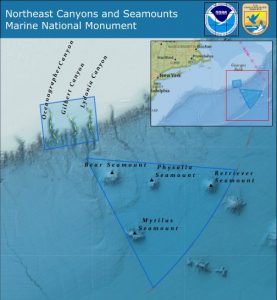 New England fishery regulators might seek to reclaim some of the authority they lost when President Barack Obama virtually walled off thousands of square miles of ocean south of Cape Cod to commercial fisheries. On Tuesday, the New England Fisheries Management Council’s Habitat Committee recommended that the regulatory council provide feedback to the Trump administration about the designation of the 4,913 square-mile area by the continental shelf. “I would strongly suggest we take the opportunity to comment,” said Eric Reid, a council member and the general manager of Seafreeze Shoreside, a seafood processing facility in Galilee, Rhode Island. While the committee members did not delve into what the letter should say during Tuesday’s meeting, the council chairman, former Rep. John Quinn, the director of public interest at the UMass School of Law in Dartmouth, made clear he believes the council should have jurisdiction.
New England fishery regulators might seek to reclaim some of the authority they lost when President Barack Obama virtually walled off thousands of square miles of ocean south of Cape Cod to commercial fisheries. On Tuesday, the New England Fisheries Management Council’s Habitat Committee recommended that the regulatory council provide feedback to the Trump administration about the designation of the 4,913 square-mile area by the continental shelf. “I would strongly suggest we take the opportunity to comment,” said Eric Reid, a council member and the general manager of Seafreeze Shoreside, a seafood processing facility in Galilee, Rhode Island. While the committee members did not delve into what the letter should say during Tuesday’s meeting, the council chairman, former Rep. John Quinn, the director of public interest at the UMass School of Law in Dartmouth, made clear he believes the council should have jurisdiction. 